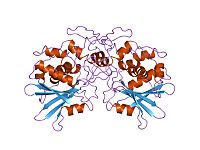Ribosome-inactivating protein

Ribosome-inactivating protein is a substance that can be found in plants. They are called this because they can "switch off" the ribosomes in cells, which are like tiny factories that make proteins.
Imagine that each cell in your body is like a tiny factory that makes different things. Ribosomes are the machines in this factory that make proteins, which are like the building blocks of your body. But sometimes, bad guys (like viruses or bacteria) can get into the factory and start making things they shouldn't.
Here's where ribosome-inactivating protein comes in. It's like a superhero that can stop the bad guys in their tracks. When it gets into a cell, it can recognize the ribosomes and turn them off, meaning that the bad guys can't make any more bad stuff.
This is really important for plants, because they can't move around to avoid being attacked by bad guys. Instead, they make ribosome-inactivating protein as a defense mechanism. If a pest tries to eat the plant, the protein will stop the pest from being able to make more proteins, so it won't be able to grow and reproduce.
Overall, ribosome-inactivating protein is a cool natural defense mechanism that plants have developed to protect themselves from pests.
Imagine that each cell in your body is like a tiny factory that makes different things. Ribosomes are the machines in this factory that make proteins, which are like the building blocks of your body. But sometimes, bad guys (like viruses or bacteria) can get into the factory and start making things they shouldn't.
Here's where ribosome-inactivating protein comes in. It's like a superhero that can stop the bad guys in their tracks. When it gets into a cell, it can recognize the ribosomes and turn them off, meaning that the bad guys can't make any more bad stuff.
This is really important for plants, because they can't move around to avoid being attacked by bad guys. Instead, they make ribosome-inactivating protein as a defense mechanism. If a pest tries to eat the plant, the protein will stop the pest from being able to make more proteins, so it won't be able to grow and reproduce.
Overall, ribosome-inactivating protein is a cool natural defense mechanism that plants have developed to protect themselves from pests.
